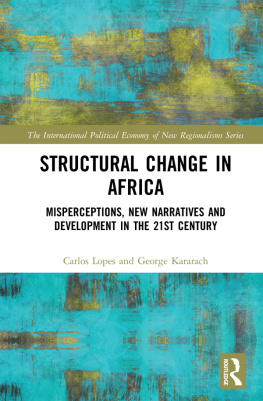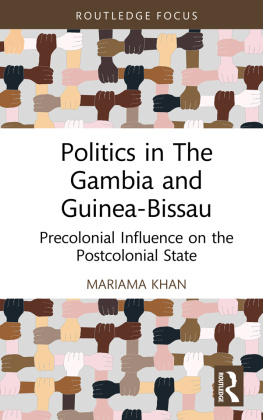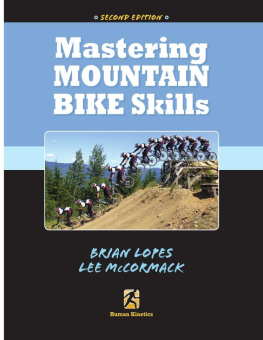To Emilia, with affection
History is not a mathematical calculation; it does not possess a decimal system, a progressive enumeration of equal quantities amenable to the four basic operations, the solution of equations and the extraction of roots. Quantity (economic structure) turns into quality because it becomes an instrument of action in men's hands men whose worth is to be seen not only in terms of their weight, their size and the mechanical energy they derive from their muscles and nerves, but in the fact that they have a mind, that they suffer, understand, rejoice, desire and reject.
Antonio Gramsci
Guinea-Bissau
From Liberation Struggle to Independent Statehood
Carlos Lopes
Translated by Michael Wolfers
First published 1987 by Westview Press
Published 2018 by Routledge
52 Vanderbilt Avenue, New York, NY 10017
2 Park Square, Milton Park, Abingdon, Oxon OX14 4RN
Routledge is an imprint of the Taylor & Francis Group, an informa business
Copyright Carlos Lopes, 1987.
All rights reserved. No part of this book may be reprinted or reproduced or utilised in any form or by any electronic, mechanical, or other means, now known of hereafter invented, including photocopying and recording, or in any information storage or retrieval system, without permission in writing from the publishers.
Notice:
Product or corporate names may be trademarks or registered trademarks, and are used only for identification and explanation without intent to infringe.
British Library Cataloguing in Publication Data
Lopes, Carlos
Guinea Bissau: from liberation struggle
to independent statehood.
1. Guinea-BissauPolitics and
government
I. Title
966.5702 DT613.6
Library of Congress Cataloging-in-Publication Data
Lopes, Carlos
Guinea Bissau, from liberation struggle to
independent statehood
Bibliography: P.
1. Guinea-BissauPolitics and government.
I. Title
DT613.6.L67 1987 966.57 87-6077
ISBN 13: 978-0-367-00551-1 (hbk)
My first encounter with the reality of Guinea-Bissau dates back to early November 1970. After having crossed the southern border on foot during the last night of rain that year, I found myself in liberated territory, people and leaders united for the purpose of putting an end to colonialism. The memory remains with me, forcefully. Today, in spite of the persistence of neocolonialism, not much of the unity of those days remains visible in Guinea-Bissau. Why?
Carlos Lopes, a Guinean intellectual, tries to give a scientific contribution to the answer to that fundamental question in this book. It certainly merits the serious attention of all of us who are involved in trying to understand the historical transition of Africa.
In November 1977, in Bissau, I met Carlos Lopes for the first time. He was then the young and dynamic director of the Casa da Cultura (House of Culture), a publicly owned bookshop established specifically to promote the spreading in Guinea-Bissau of serious writing about Africa and the world. Today, in 1987, Carlos Lopes is still a young and dynamic director. But he now directs the Instituto Nacional de Estudos e Pesquisa (INEP, National Institute of Studies and Research), a new social science research centre in Bissau, established specifically to promote serious and autonomous research about the conditions of development in Guinea-Bissau. In the meantime, he has himself gone deeply into historical and sociological studies.
The text by Carlos Lopes which Zed is now publishing was originally a piece of student work, prepared for the obtainment of an academic diploma. It bears the marks of this origin, in the sense that it mirrors the sometimes tortuous road toward deeper knowledge followed by its author. Various brands of marxism, dependency theory, other third world revolutionary thinking, as well as western modernization sociology, political science, and other lines of thought, are tried and tested against the thinking of Amilcar Cabral, assassinated leader and theoretician of the revolution of Guinea, and also against the author's own experiences of life in his own country. In these first parts the work is essentially an exercise in clearing the road.
But gradually we get into the burning heart of the matter. What are the implications, risks and opportunities contained in the process of transition from colonialism, by way of a successful national liberation movement, to a state with doubtful nation-state credentials? Carlos Lopes is wise enough not to offer any easy answers to difficult questions. But what he shows should be provocative enough, both to representatives of that "petty bourgeoisie" which led the struggle for national liberation but today, for very objective reasons, seems to have exhausted its revolutionary potential unless radically democratized, and to marxists unwilling to allow their class analyses to be complicated by the realities of cultural and political diversity in Africa.
Near the end of his text, Carlos Lopes notes that if there were any "conclusions" to be drawn from his analyses, these would certainly have to be pessimistic. There is very little ground for any easy short term optimism in the present situation of Guinea-Bissau or sub-Saharan Africa in general. But he also quotes Antonio Gramsci in saying that "the pessimism of reason should not obstruct the optimism of will." The future is not closed.
Uppsala 1987
Lars Rudebeck
Guinea-Bissau became well-known through its armed struggle against Portuguese colonialism. Understanding the historical transition of this countryfrom national liberation movement to stateis essential in interpreting the country's nascent social reality. The route that led me to this exercise was not characterized by a spectator's passivity, nor by abstract introspection. In searching deeply for an explanation of today's power relations, my aim was always one of active participation.
Encompassing this seeming complexity requires a precise route that is expressed for me in Shakespeare's: 'Come on, then, I will swear to study so/ To know the thing I am forbid to know...' ( Love's Labours Lost, Act 1, Scene 1).
Research requires a theoretical framework and a basic methodology that are neither inflexible nor erratic, I had to construct a theoretical model, and situate myself in the various intellectual currents and eddies through which scientific enterprise navigates. I now want to discuss the general principles that guided my work.
Any society, at a particular phase of its development, may be associated with specific relations of production that along with its superstructure provide a social and economic formation. The role of the researcher in the human sciences is to interpret that societyand its political, social, economic or cultural aspectsaccording to his view of the world, and to bring into the open its postulates and methodological base. Thus there is, for example, an enormous gulf in a priori concepts underlying social perception between a bourgeois idealist attitude (pragmatism, existentialism, etc.) and the historical materialist method. Historical materialism teaches us that being determines consciousness. That is to say that the relations of production established at a given moment, independently of consciousness, have a direct influence on the development of human society. They determine the economic base on which the political and juridical superstructure (including the state apparatus) is raisedwhich is no more nor less than the expression of social consciousness. One discipline is able to incorporate these phenomena: sociology. But sociology as a science presents highly significant methodological imperfections. Jean Ziegler calls our attention to the meta-social institutionusages and regulate behaviour. Bourgeois science can also, Ziegler adds, serve to institute immutable, ahistoric 'truths' and so perpetuate bourgeois society.









